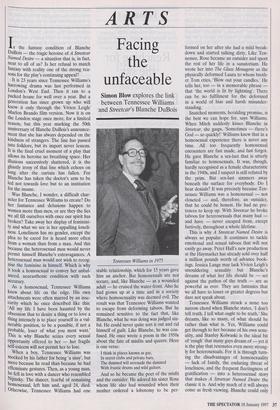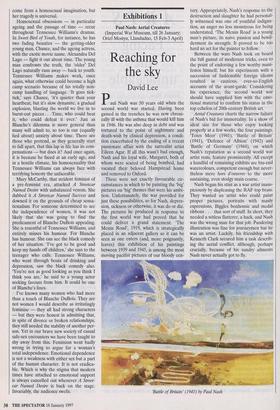ARTS
Facing the unfaceable
Simon Blow explores the link between Tennessee Williams and Streetcar's Blanche DuBois Is the fantasy condition of Blanche DuBois — the tragic heroine of A Streetcar Named Desire — a situation that is, in fact, near to all of us? Is her refusal to match fantasy with reality one of the strong rea- sons for the play's continuing appeal? It is 23 years since Tennessee Williams's harrowing drama was last performed in London's West End. Then it ran to a packed house for well over a year. But a generation has since grown up who will know it only through the Vivien Leigh/ Marlon Brando film version. Now it is on the London stage once more, for a limited season, but this year marking the 50th anniversary of Blanche DuBois's announce- ment that she has always depended on the kindness of strangers. The line has passed into folklore, but its import never lessens. It is the final cruel moment of a play that allows its heroine no breathing space. Her illusions successively shattered, it is the ghastly irony of that line which echoes on long after the curtain has fallen. For Blanche has taken the doctor's arm to be led not towards love but to an institution for the insane.
Was Blanche, I wonder, a difficult char- acter for Tennessee Williams to create? Do her fantasies and delusions happen to women more than men, or are they the lies we all fill ourselves with once our spirit has broken? Take away her display of feminini- ty and what we see is her appalling loneli- ness. Loneliness has no gender, except the plea to be cared for is heard more often from a woman than from a man. And this because the heterosexual man would never permit himself Blanche's extravagances. A heterosexual man would not wish to recog- nise the feminine in himself. Which is why it took a homosexual to convey her unbal- anced, neurasthenic condition with such accuracy.
As a homosexual, Tennessee Williams knew about life on the edge. His own attachments were often marred by an inse- curity which he once described like this: All my life I have been haunted by the obsession that to desire a thing or to love a thing intensely is to place yourself in a vul- nerable position, to be a possible, if not a probable, loser of what you most want.' This is why Blanche seizes every sexual Opportunity offered to her — her fragile self-esteem will not permit her to lose.
When a boy, Tennessee Williams was mocked by his father for being 'a sissy', but more because he read than because he had effeminate gestures. Then, as a young man, he fell in love with a dancer who resembled Nijinsky. The dancer, fearful of remaining homosexual, left him and, aged 24, died. Otherwise, Tennessee Williams had one Tennessee Williams in 1975 stable relationship, which for 15 years gave him an anchor. But homosexuals are not secure, and, like Blanche — as a wounded adult — he cruised the water-front. Also he had grown up at a time and in a society where homosexuality was deemed evil. The result was that Tennessee Williams wanted to escape from deforming taboos. But he remained sensitive to the fact that, like Blanche, what he was doing was judged sin- ful. He could never quite sort it out and rid himself of guilt. Like Blanche, he was con- fused. He once wrote a poem in the 1950s about the fate of misfits and queers. Here is one verse:
I think in places known as gay, In secret clubs and private bars, The damned will serenade the damned With frantic drums and wild guitars.
And so he became the poet of the misfit and the outsider. He adored his sister Rose whom life also had wounded when their mother ordered a lobotomy to be per- formed on her after she had a mild break- down and started talking dirty. Like Ten- nessee, Rose became an outsider and spent the rest of her life in a sanatorium. He wrote her into The Glass Menagerie as the physically deformed Laura to whom broth- er Tom cries, 'Blow out your candles.' He tells her, too — in a memorable phrase that 'the world is lit by lightning'. There can be no fulfilment for the deformed in a world of bias and harsh misunder- standing.
Snatched moments, heralding promise, is the best we can hope for, says Williams. When Mitch suddenly kisses Blanche in Streetcar, she gasps, 'Sometimes — there's God — so quickly!' Williams knew that in a homosexual experience there is never any time. All too frequently homosexual encounters are fast made, and fast forgot. He gave Blanche a sex-lust that is utterly familiar to homosexuals. It was, though, hardly recognised as a female characteristic in the 1940s, and I suspect is still refuted by the prim. But sex-lust simmers away beneath the surface for everybody. Do I hear denials? It was precisely because Ten- nessee Williams was a homosexual — not closeted — and, therefore, an outsider, that he could be honest. He had no pre- tences to keep up. With Streetcar he broke taboos for heterosexuals that many had and have — never escaped from, except furtively, throughout a whole lifetime.
This is why A Streetcar Named Desire is always so popular. It continues to tackle emotional and sexual taboos that will not easily go away. Peter Hall's new production at the Haymarket has already sold over half a million pounds worth of advance book- ings. Jessica Lange may lack Vivien Leigh's smouldering sexuality but Blanche's dreams of what her life should be — set against the pathos of the truth — are as powerful as ever. They are fantasies that we all have to lesser or greater degrees but dare not speak about.
Tennessee Williams struck a none too narrow chord when Blanche states, 'I don't tell truth, I tell what ought to be truth.' She dreams, like so many, of what should be rather than what is. Yes, Williams could get through to her because of his own sexu- ality, and Stanley Kolwaski is the ideal bit of 'rough' that many gays dream of — yet it is the play that resonates even more strong- ly for heterosexuals. For it is through turn- ing the disadvantages of homosexuality — lack of family, the enduring threat of loneliness, and the frequent fleetingness of gratification — into a heterosexual story that makes A Streetcar Named Desire the classic it is. And why much of it will always come as fresh viewing. Blanche could only come from a homosexual imagination, but her tragedy is universal.
Homosexual obsessions — in particular ageing and the passage of time — recur throughout Tennessee Williams's dramas. In Sweet Bird of Youth, for instance, he has two fading beauties — the getting-older young man, Chance, and the ageing actress, with the exotic movie name, Alexandra Del Lago — fight it out about time. The young man confronts the truth, the 'older' Del Lago naturally runs away — back to youth. Tennessee Williams makes work, once again, what otherwise could become a high camp scenario because of his totally non- camp handling of language. 'It goes tick- tick,' says Chance, 'it's quieter than your heartbeat, but it's slow dynamite, a gradual explosion, blasting the world we live in to burnt-out pieces . . . Time, who could beat it, who could defeat it ever.' Just as Blanche's dilemma is more general than many will admit to, so too is our (equally lied about) anxiety about time. There are those who pretend, as they generally start to fall apart, that this lap in life has its com- pensations — but does it? And once again, it is because he faced at an early age, and in a hostile climate, his homosexuality that Tennessee Williams can always face with terrifying honesty the unfaceable.
Mary McCarthy, that strident feminist of a pre-feminist era, attacked A Streetcar Named Desire with unbalanced venom. She dubbed it A Streetcar Named Success and downed it on the grounds of cheap sensa- tionalism. For someone determined to see the independence of women, it was not likely that she was going to find the predicament of Blanche DuBois appealing. She is resentful of Tennessee Williams, and entirely misses his humour. For Blanche has humour. She can see the black comedy of her situation. 'I've got to be good and keep my hands off children,' she says to the teenager who calls. Tennessee Williams, who went through bouts of drinking and depression, saw the black comedy also. `You're not as good looking as you think I think you are,' he said to a young actor seeking favours from him. It could be one of Blanche's lines.
I've known many women who had more than a touch of Blanche DuBois. They are not women I would describe as irritatingly feminine — they all had strong characters — but they were honest in admitting that, in spite of divorce or broken relationships, they still needed the stability of another per- son. Yet in our brave new society of casual safe-sex encounters we have been taught to shy away from this Feminism went badly wrong in trying to argue for a woman's total independence. Emotional dependence is not a weakness with either sex but a part of the human character. It is not eradica- ble. Which is why the stigma that modern times have attached to emotional support is always cancelled out whenever A Street- car Named Desire is back on the stage. Invariably, the audience swells.



























































 Previous page
Previous page